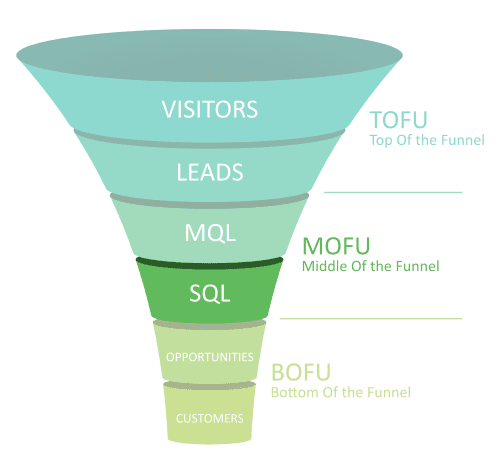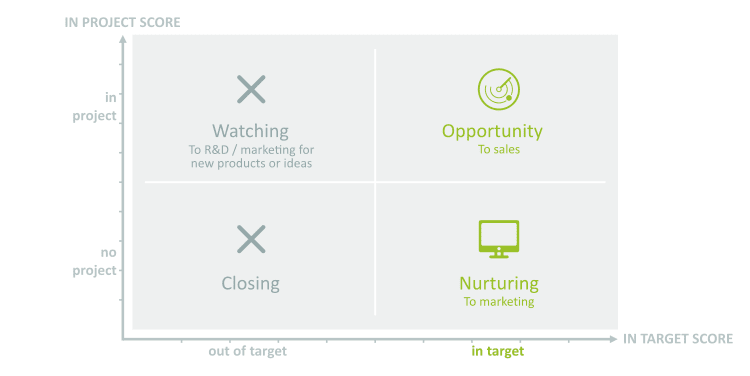The simple guide to SQLs for chemical marketers
With all its jargon, it is sometimes a real headache to find your way around marketing terms. Among the list, SQL is one of those catch-all acronyms, sometimes misused, yet an essential concept for any successful marketing strategy.
Today we're going to unravel the SQL, the sales qualified lead. But before diving into the SQL, we encourage you to read our MQL guide if you aren't familiar with this term.
|
SUMMARY |
SQL: the definition
Once your lead is identified as MQL by the marketing team, your sales team takes over. Their mission is to qualify the prospect’s needs to ensure their interest in your chemical products and confirm they are ready to progress through the purchasing process.
Most of the times, the qualification is a short phone call or email exchange to ask specific questions about the project, the expected outcomes, the current challenges, the target applications etc.
Once qualified, a MQL having a project fitting with your solution will become a SQL and continue the buying journey with you.
A SQL is a MQL which you qualified to determine if there is an active project and a validated interest in your products and company.
 Position of the SQL in the sales and marketing funnel
Position of the SQL in the sales and marketing funnel
How to identify a SQL
The criteria that define what is a good SQL can significantly vary from a chemical supplier to another. Several techniques exist to build your qualification criteria.
At SpecialChem, we rely on the Qualification Matrix to identify SQL for chemical suppliers.
With this method, you will score each MQL in 2 dimensions.
Project score: Is your MQL having an active and solid project?
The project criteria are almost universal for chemical companies and it ranges from 0 (no project at all) to 8 (a solid project).
- Objective: The lead has a specific objective in mind, like improving a specific property, passing a regulation or solving a current problem.
- Timing: The project has a clear deadline or the problem needs to be solved quickly
- Sampling: The lead wants to receive a sample to start testing your product
- Potential: The lead can share or describe volumes
In-target score: Is your MQL in your target persona?
Unlike the project score, your in-target criteria are unique and only depend to your technology and buyers persona. Each criteria will contribute from 0 (out-of-scope) to 2 (ideal persona).
- Identify your exclusion indicators: wrong resins or conversion modes, forbidden countries... If the lead checks at least one of those, the in-target score will be 0
- List the criteria defining your ideal customer (2 points), secondary target (1 point) and out-of-target lead (0 point): activity, application, technology, conversion mode, region…
- Keep only the most important criteria that are really making the differences
To ensure an optimal follow-up from the qualification to the sales, it is crucial to answer all those questions during your discussion.
After verifying each criterion, you will be able to map your leads on your qualification matrix based on their scores. Their position in this matrix will determine your best follow-up.
The matrix can be split in 4 quadrants:
 The qualification matrix we use at SpecialChemspan>
The qualification matrix we use at SpecialChemspan>
- Opportunity: the MQL is having a clear project and is in your persona. This is a SQL. Your sales need to follow-up, and they’d better do it quickly.
- Nurturing: the MQL is in your persona but there is no current project yet. It is premature to dispatch this prospect to your sales right now. Your marketing should better nurture those leads until they are having a project.
- Closing: the MQL is not matching your persona and curiosity was the only driver.
- Watching: the MQL is not matching your persona, yet they had a clear project in mind. This quadrant may seem irrelevant for your business, yet it may hold potential for new business developments. If dozens of similar projects fall into that bucket, the Qualification Matrix will help you to see it on time.
You can download our guide to build your lead qualification criteria if you need help.
From MQL to SQL, how to improve your conversion rate
Measuring your conversion rate is a child’s play. The formula is:
Conversion Rate = Number of SQL / Number of MQL
Your MQL-to-SQL conversion rate is an excellent indicator of your marketing strategy but it's easy to misinterpret it. Our best practices will guide you to understand and improve it.
1. Good is not necessarily high
You may think that a good conversion is necessarily high. It is true in general but not in that case.
A too high conversion rate could mean than your MQL criteria are too restrictive, and you may be missing good opportunities and leads to nurture.
On the opposite, a low conversion rate would indicate that you are qualifying premature MQL, not filtering enough the profiles due to a lack of data, or not reactive enough which is our next point.
2. Be reactive to qualify your leads
Whether you detected a MQL interacting with your content or received a direct request on your website, the best timing to contact and qualify your lead is as fast as you can.
From ideally 1h to an acceptable 48h — working days only — the more reactive you are, the higher the chance to reach the person and capitalize on their interactions with you or your content.
A low reactivity can significantly impact your conversion rate.
Let’s take a delirious example.
Imagine that you just sent an online request to get a sample of a new antioxidant to test it, but the company replies two months later. How would you react? You’d certainly not even remember who they are and why they try to reach out to you. Worst, you may certainly not consider them as serious and reliable partner to work with.
The same can be applied when a company calls you weeks later after you downloaded a document that you can barely remember. It is just annoying and that’s the only footprint you may leave in your MQL’s mind.
People are expecting reactivity, and even more in this digital time.
Don’t give up on the first call or email attempt.
When trying to contact someone, it is easy to drop the ball if the person doesn’t respond to your phone attempts and emails.
A frequent mistake we see during the qualification stage is the low number of attempts to get in touch with a prospect.
Even if they sent you an online request, never assume that MQLs will respond on your very first contact attempt. Most of the time, you’ll need to be a bit more persistent, while being careful not crossing the harassment line.
The quicker you pick up the phone or send an email, the less you will need to persist. Never give up on a MQL until you reach 6 attempts.
At SpecialChem, we recommend making the first contact within 24h. Start by a phone attempt, and if not answering, send an email right away. You can try again the next day and the week after.
3. Appoint inside sales to run the qualifications
Asking your sales team to qualify the MQL sounds like a wise and obvious choice. But this organization often creates bottlenecks when it comes to qualify your MQL.
Sales representatives have clear business objectives. They need to sign opportunities to bring cash to the company.
If they have to choose — and they will have to — between qualifying a MQL or following-up with a customer to renew, there is no good reason for them to go for the first choice.
Qualifying leads takes time, time your sales can’t and don’t want to waste trying to call and email your MQL to identify business opportunities. They are focused on customers and won’t be as reactive as they should, despite all their good will.
If they are on a business trips visiting a converter, they won’t be available to quickly qualify your incoming MQLs.
Inside sales appear as a wiser solution. In between sales and marketing, their mission is to qualify marketing leads and dispatch the opportunities to the sales.
They must be able to have technical discussions with your prospects to rapidly understand if there is a match.
As lead qualification is their primary objective, they will take care to optimize each part of the process, from the contact attempts to the qualification report.
No matter how you setup your SQL organization, do it at your own pace and keep an eye on your performances. Don’t waste your time comparing yourself to how leaders perform. You may focus on the wrong directions trying to copy them instead of working on your hottest priorities.
You can also seek coaching from digital experts in the chemical industry.
At SpecialChem, we run lead management workshops to help chemical suppliers defining their buyer’s persona, building their MQL criteria, and improving their lead conversion with actionable best practices and recommendations. Contact us to get more information about our lead management workshops